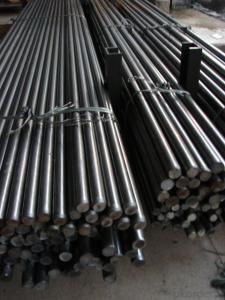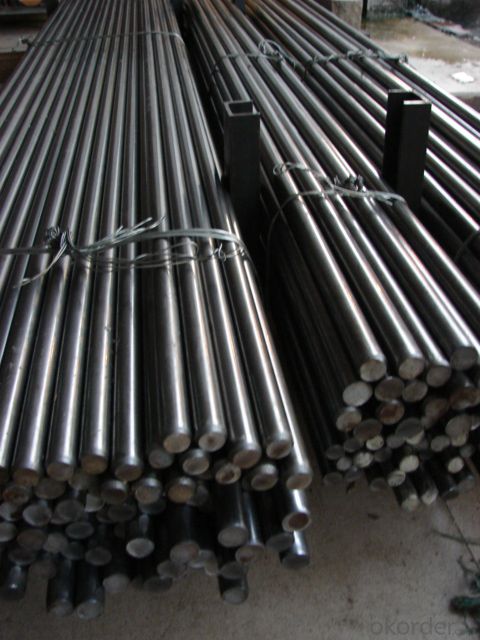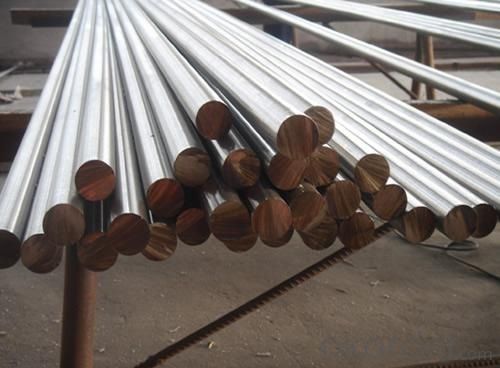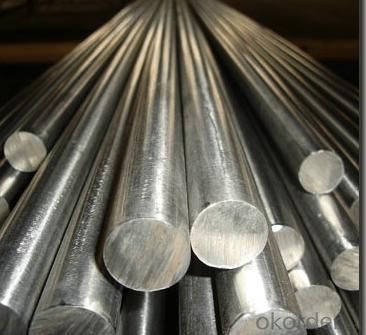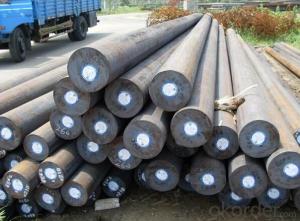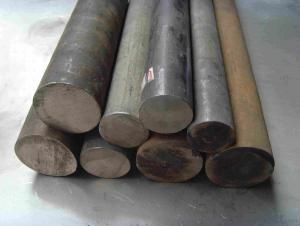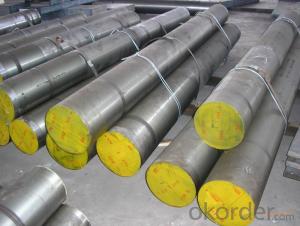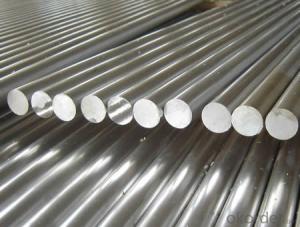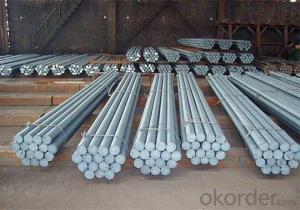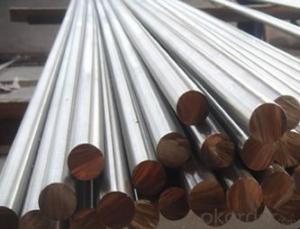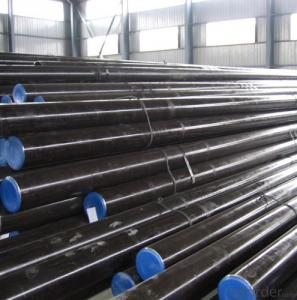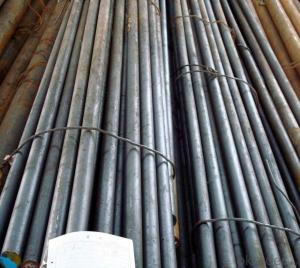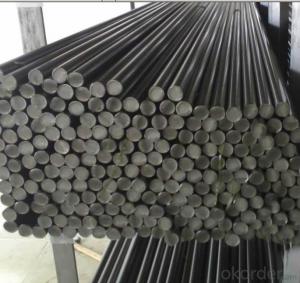High Quality Spring Steel Round Bar 28-32mm
- Loading Port:
- China main port
- Payment Terms:
- TT or LC
- Min Order Qty:
- 100 m.t
- Supply Capability:
- 10000 m.t/month
OKorder Service Pledge
OKorder Financial Service
You Might Also Like
High Quality Spring Steel Round Bar 28-32mm
Product Description:
Spring Steel can be divided into two types. One is carbon spring steel, and other one is alloy spring steel.
Alloy spring steel is based on carbon spring steel, by adding one or more alloying elements to improve the mechanical properties, hardenability and other properties to meet the requirement for manufacture all kinds of spring steel.
Specification of High Quality Spring Steel Round Bar 28-32mm:
-Material: 1065
-Standard: ASTM
-Production: Hot rolled or cold rolled
-Type: Spring Steel
| Diameter(mm) | Mass(kg/m) | Section(mm2) |
| 28 | 4.83 | 615.44 |
| 30 | 5.55 | 706.5 |
| 32 | 6.31 | 803.84 |
Corresponding Steel Grade of High Quality Spring Steel Round Bar 28-32mm for Reference:
USA, ASTM | CHN, GB/T | JPN, JIS | ISO |
1065 | 65 | SWRH67A SWRH67B | Type SC Type DC |
FRA, NF | GBR, BS | ||
C66D | C66D |
Chemical Composition of High Quality Spring Steel Round Bar 28-32mm:
C | Mn | Ni | Si |
0.62~0.70 | 0.50~0.80 | ≤0.30 | 0.17~0.37 |
P | S | Cr | Cu |
≤0.035 | ≤0.035 | ≤0.25 | ≤0.25 |
Mechanical Properties of High Quality Spring Steel Round Bar 28-32mm:
-Tensile Strength σb (MPa): ≥695
-Yield Strength σs (MPa): ≥410
-Elongation δ10(%): ≥10
-Percentage reduction of area: ψ (%): ≥30
-Hardness HBS, no heat treatment: ≤255
Usage/Applications of High Quality Spring Steel Round Bar 28-32mm:
-ASTM1065, is medium-high carbon spring steel. After heat treatment, this type of steel obtains high strength, hardness and elasticity but this material isn’t perfect for welding.
-Its fatigue strength is equal to alloy spring steel when they are in same configuration.
-For manufacturing spring, spring circle, all kinds of grommet, clutch, and axels in the production of normal machine.
Packaging & Delivery of High Quality Spring Steel Round Bar 28-32mm:
-Packing Detail: The products can be packed in bundles by steel wires.
-Marks: There are two types of marks. One is color mark and other one is tag mark. We paint color marks on both ends of bundles to make sure that it’s more convenient for customers to distinguish their products from other products at the destination port. The tag marks will be tied up to each bundle to make sure that customers know the specifications of each bundle like product’s name and size and other information of products.
-Delivery Detail:
1, Delivery time: 30~60 working days after receive buyer’s T.T. or L/C.
2, Delivery status should be written in the contract. (Heat treatment or no)
FAQ:
Q1: Why buy Materials & Equipment from OKorder.com?
A1: All products offered byOKorder.com are carefully selected from China's most reliable manufacturing enterprises. Through its ISO certifications, OKorder.com adheres to the highest standards and a commitment to supply chain safety and customer satisfaction.
Q2: How do we guarantee the quality of our products?
A2: We have established an advanced quality management system which conducts strict quality tests at every step, from raw materials to the final product. At the same time, we provide extensive follow-up service assurances as required.
Q3: How soon can we receive the product after purchase?
A3: Within three days of placing an order, we will arrange production. The shipping date is dependent upon the quatity, how many sizes you want and the plan of production, but is typically 1 month to 2 month days from the beginning of production.
Images of High Quality Spring Steel Round Bar 28-32mm:
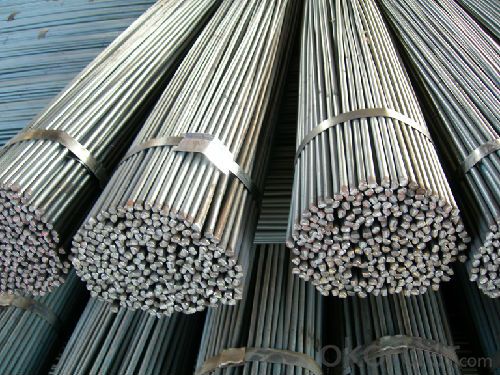
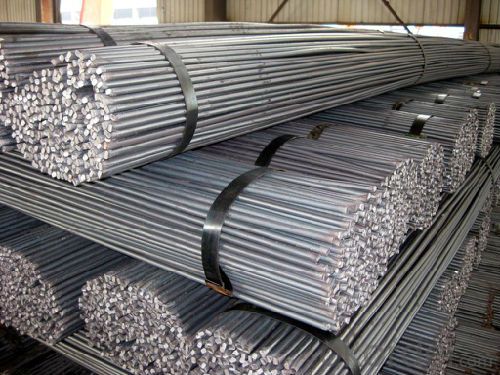
*If you would like to get our price, please inform us the size, standard/material and quantity. Thank you very much for your attention.
- Q: Can special steel be used for making power generation equipment?
- Yes, special steel can be used for making power generation equipment. Special steels are specifically designed to have enhanced properties such as high strength, corrosion resistance, heat resistance, and wear resistance. These properties make special steel suitable for use in demanding applications such as power generation equipment, which often operates under high temperatures and pressures. Power generation equipment, such as turbines, boilers, and generators, require materials that can withstand harsh operating conditions and deliver reliable performance over an extended period. Special steel grades, such as stainless steels, nickel-based alloys, and heat-resistant steels, are commonly used in the construction of power plants and power generation equipment. Stainless steels are frequently used in power generation due to their excellent corrosion resistance, which is crucial for equipment exposed to high moisture or aggressive environments. Nickel-based alloys are renowned for their exceptional high-temperature strength, making them ideal for components subjected to extreme heat, such as turbine blades or exhaust systems. Heat-resistant steels, on the other hand, are specifically designed to retain their mechanical properties at elevated temperatures, making them suitable for applications such as boilers and heat exchangers. In summary, special steel offers a range of desirable properties that make it highly suitable for manufacturing power generation equipment. Its strength, corrosion resistance, heat resistance, and wear resistance make it an excellent choice for withstanding the demanding conditions found in power plants and ensuring the reliable and efficient generation of electricity.
- Q: How does special steel contribute to the automotive aftermarket industry?
- Special steel plays a significant role in the automotive aftermarket industry by offering various advantages that contribute to the overall performance, durability, and safety of vehicles. Firstly, special steel is known for its exceptional strength and durability. This property allows automotive manufacturers and aftermarket suppliers to develop high-performance components and parts that can withstand extreme conditions and heavy usage. Components such as engine parts, suspension systems, and chassis components benefit from the superior strength of special steel, ensuring their longevity and reliability. Additionally, special steel offers excellent corrosion resistance, which is crucial for automotive components exposed to various weather conditions and road environments. By using corrosion-resistant steel, aftermarket suppliers can produce parts that are less prone to rust and degradation, ultimately enhancing the lifespan of vehicles and reducing the need for frequent replacements. Furthermore, special steel enables the production of lightweight components without compromising on strength. With the increasing demand for fuel efficiency and reduced emissions, lightweight materials are highly sought after in the automotive industry. By utilizing special steel, aftermarket suppliers can create lightweight parts that contribute to improved fuel economy and overall performance of vehicles. Moreover, special steel's versatility allows for the development of complex and intricate components, contributing to advancements in vehicle technology. From precision-engineered gears and shafts to specialized parts for electric vehicles, special steel can be tailored to meet specific automotive requirements, supporting the industry's continuous innovation. Lastly, special steel offers cost-effectiveness in the automotive aftermarket industry. Although the initial cost of special steel might be higher than conventional steel, its durability and longevity result in reduced maintenance and replacement costs over time. This benefit is particularly significant for aftermarket suppliers and vehicle owners, as it helps minimize expenses and ensures a higher return on investment. In conclusion, special steel plays a vital role in the automotive aftermarket industry by providing strength, durability, corrosion resistance, lightweight properties, versatility, and cost-effectiveness. These qualities contribute to the overall performance, safety, and longevity of vehicles, making special steel a crucial material in the development of high-quality aftermarket components and parts.
- Q: How does special steel contribute to the thermal conductivity of products?
- Special steel can significantly contribute to the thermal conductivity of products due to its unique composition and properties. Special steel is manufactured with specific alloying elements, such as chromium, nickel, molybdenum, or vanadium, which enhance its thermal conductivity. These alloys help in the efficient transfer of heat by increasing the free electron density within the steel. The presence of alloying elements in special steel improves its lattice structure, allowing for better heat transfer. The increased free electron density enables quick and efficient movement of thermal energy through the material. As a result, special steel can effectively conduct heat from one area to another, making it ideal for applications requiring high thermal conductivity. Furthermore, special steel is often processed using advanced techniques like heat treatment, forging, or rolling, which further optimize its properties. These processes refine the microstructure of the steel, reducing impurities and improving its thermal conductivity. The resulting steel product exhibits enhanced heat transfer capabilities and provides efficient thermal management. The high thermal conductivity of special steel makes it highly desirable for various industries and applications. It is commonly used in the manufacturing of heat exchangers, boilers, furnaces, and other thermal equipment where efficient heat transfer is crucial. Additionally, special steel is often employed in electrical appliances, such as stovetops or induction cookers, where rapid and uniform heat distribution is necessary. In summary, special steel contributes to the thermal conductivity of products by utilizing specific alloying elements and advanced processing techniques to enhance its heat transfer capabilities. Its high thermal conductivity makes it a valuable material for various industries, ensuring efficient heat management and optimal performance of thermal equipment and appliances.
- Q: How is nitriding steel used in the manufacturing of engine components?
- Nitriding steel is used in the manufacturing of engine components to improve their hardness, wear resistance, and overall performance. The nitriding process involves diffusing nitrogen into the surface of the steel, forming a hard layer of nitrides. This increases the component's resistance to abrasion, corrosion, and fatigue, making it more durable and long-lasting. Additionally, nitrided steel has high heat resistance, which is crucial for engine components exposed to high temperatures and friction. Overall, the use of nitriding steel in engine manufacturing enhances the reliability and efficiency of the engine, leading to improved performance and longevity.
- Q: Can special steel be used in the oil and gas equipment manufacturing industry?
- Yes, special steel can be used in the oil and gas equipment manufacturing industry. Special steel alloys, such as stainless steel and alloy steel, possess high corrosion resistance, strength, and durability, which are crucial properties for equipment used in the oil and gas sector. Special steel is commonly used in the manufacturing of pipelines, valves, drill bits, and other critical components due to its ability to withstand harsh operating conditions and maintain structural integrity.
- Q: What are the different tooling grades of special steel?
- There are various tooling grades of special steel, each designed to fulfill specific requirements and applications. Some common tooling grades include high-speed steel (HSS), which is known for its excellent heat resistance and durability; carbide steel, which is extremely hard and suitable for cutting tools; and stainless steel, which offers corrosion resistance and is commonly used for precision tools. Other tooling grades may include alloy steel, tool steel, and die steel, among others, each tailored to different tooling needs.
- Q: How does special steel perform in high-speed applications?
- Special steel performs exceptionally well in high-speed applications. Its unique composition and properties, such as high strength, hardness, and toughness, allow it to withstand extreme conditions, including high temperatures, vibrations, and stresses. This ensures reliable performance, minimal wear, and extended service life, making special steel an ideal choice for high-speed applications where precision, durability, and efficiency are critical.
- Q: How does special steel perform in high-temperature creep conditions?
- Special steel is specifically designed and engineered to perform exceptionally well in high-temperature creep conditions. It exhibits remarkable resistance to deformation and maintains its mechanical properties even at elevated temperatures, making it highly reliable and suitable for applications that require stability and strength in such environments.
- Q: How are magnesium alloys used in lightweight structures?
- Magnesium alloys are used in lightweight structures due to their exceptional strength-to-weight ratio. They are commonly employed in the aerospace industry for constructing aircraft components, such as fuselage frames, wings, and engine parts. Additionally, magnesium alloys find applications in automotive manufacturing, where they contribute to reducing the weight of vehicles, thus enhancing fuel efficiency. These alloys are also utilized in the production of portable devices, sporting equipment, and other products that require a combination of strength and lightness.
- Q: What are the different methods of non-destructive testing for special steel?
- Special steel can be evaluated for quality and integrity without causing damage using various non-destructive testing (NDT) methods. These methods encompass: 1. Ultrasonic Testing (UT): By emitting high-frequency sound waves with a transducer, defects like cracks or voids within the special steel can be detected. The reflections or echoes are then analyzed to identify any anomalies. 2. Magnetic Particle Testing (MT): This technique relies on magnetic fields to primarily detect surface or near-surface defects in special steel. Inducing a magnetic field in the material and applying magnetic particles allows any discontinuities or defects to gather, forming visible indications. 3. Liquid Penetrant Testing (PT): Involving the application of a liquid dye or penetrant to the special steel's surface, this method draws the penetrant into any surface defects through capillary action. After removing excess penetrant and applying a developer, the indications become visible. 4. Radiographic Testing (RT): This technique employs X-rays or gamma rays to inspect the internal structure of special steel. By exposing the material to radiation and capturing the transmitted radiation on film or a digital detector, any inconsistencies or defects within the material become visible on the resulting image. 5. Eddy Current Testing (ECT): Mainly used for detecting surface or near-surface defects, ECT involves inducing an alternating current into a coil to create an electromagnetic field. Variations in the material's electrical conductivity or magnetic permeability caused by defects generate changes in the coil's impedance, which can be analyzed. 6. Visual Testing (VT): While not a direct NDT method, visual inspection serves as a preliminary step to identify surface defects or irregularities in special steel. By thoroughly visually examining the material with appropriate lighting and magnification tools, any issues can be detected. These diverse methods of non-destructive testing offer valuable insights into special steel's quality, ensuring its structural integrity and reliability across various applications. The selection of a specific method depends on factors like the type and location of the defect being sought, as well as the industry or application's specific requirements.
Send your message to us
High Quality Spring Steel Round Bar 28-32mm
- Loading Port:
- China main port
- Payment Terms:
- TT or LC
- Min Order Qty:
- 100 m.t
- Supply Capability:
- 10000 m.t/month
OKorder Service Pledge
OKorder Financial Service
Similar products
Hot products
Hot Searches
Related keywords
